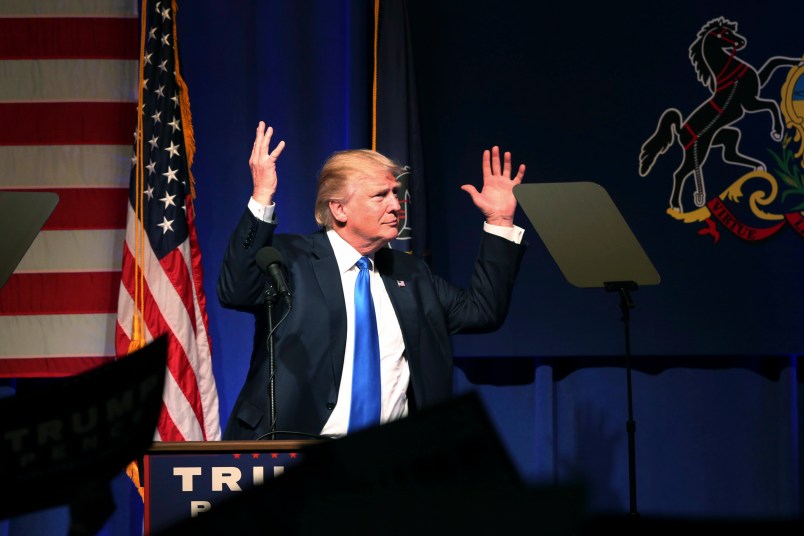In a meeting with the New York Times on Tuesday, President-elect Donald Trump brushed off concerns about his global holdings and business conflicts, declaring that “the law’s totally on my side, the president can’t have a conflict of interest.”
Trump told the New York Times that his business empire was “so unimportant” compared to the presidency, but acknowledged that his Washington, D.C. hotel was most likely “a more valuable asset” than it had been prior to his unexpected election victory.
The President-elect addressed reports that he asked leaders of the Brexit movement to oppose offshore wind farms in Scotland, like the one that’s visible from his golf course in Aberdeenshire.
“I might have brought it up,” he said, according to New York Times reporter Maggie Haberman.
Trump said that it would be difficult to sell off his businesses because of the real estate holdings involved, and told the Times that he had turned over management of his businesses to his adult children.
Experts have noted that such an arrangement is not actually considered a blind trust, given the role that Trump’s children have played in the transition and may continue to play in his incoming administration.
Trump pushed back on that characterization. “If it were up to some people,” he said, as quoted by the Times, “I would never, ever see my daughter Ivanka again.”
He said that his situation was unique.
“In theory I could run my business perfectly and then run the country perfectly. There’s never been a case like this,” he told the Times.
According to the Emoluments Clause of the U.S. Constitution, however, “no person holding any office of profit or trust” may “accept of any present, emolument, office, or title, of any kind whatever” from a foreign leader or government unless Congress gives its consent.
As the New York Times reported on Monday, Trump’s real estate partnerships and business dealings with entities controlled by or connected to foreign governments “could easily run afoul of the Emoluments Clause” if the President-elect continues to be involved after taking office.
Zephyr Teachout, a law professor at Fordham and former Democratic congressional candidate in New York, told the Times that there was not “a lot of precedent” regarding the Emoluments Clause’s relevance to Trump’s vast business empire.
“Presidents in the past have gone out of their way to avoid getting even close to the Emoluments Clause,” she said, as quoted in the report.
Members of the President-elect’s transition team have shrugged off any such concerns. In a conference call with reporters on Monday morning, spokesman Jason Miller said that legal counsel are “comfortable” with all the meetings Trump has held so far, including those with business partners. He told reporters on an update call Tuesday that he’d let Trump address those conflict-of-interest questions about his businesses himself.
Senior advisor Kellyanne Conway was also apparently unconcerned, telling reporters on Monday that she was “very confident” Trump is not breaking laws with his business practices during the transition process.







Ah. Kellyann meant that Trump is violating the Constitution, but not any particular statute.
Remember to use that one in your impeachment trial in the Senate.
PresideNts can’t BreaK the Law. They Are the lAw…
This attitude worked well for Nixon…
Interestingly, it won’t be up to him to decide whether he’s breaking the law or not. More proof that he does not understand the job he will be taking in January. Save us all from ignorance.